A £500,000 win for a retired couple who sued over a 17-storey £35million office tower blocking their light will ’embolden’ others to try to claw huge sums from developers who throw their homes into darkness, MailOnline can reveal today.
Stephen and Jennifer Powell complained that the Arbor tower, part of the £2billion Bankside Yards development, ‘substantially’ reduced the natural light getting into their 6th floor apartment next door on London‘s South Bank.
The couple claimed they could never read in their bedroom without a light on.
Bankside Yards is eventually set to consist of eight towers, including ‘mega-structures’ 50 storeys high – with Arbor being the first and so far only building completed between 2019 and September 2021.
But developers ran into trouble when the Powells and their 7th floor neighbour Kevin Cooper sued, seeking an injunction to protect their rights of light and threatening the tower with potentially being torn down.
Mr Justice Fancourt, ruling on the case at London’s High Court, has now refused the neighbours an injunction – saying that more than £200million would be wasted in demolishing and rebuilding the tower, plus associated ‘environmental damage’.
But he went on to find that the couple’s flat in the designer block Bankside Lofts was ‘substantially affected’ by their light being cut off. And he ordered the co-developer of the site, Ludgate House Ltd, to pay the Powells £500,000 in damages, plus £350,000 to Mr Cooper.
Legal experts told MailOnline today that while it may not open the floodgates due to the costs involved, the ruling is potentially good news for homeowners with the means to fight developers.
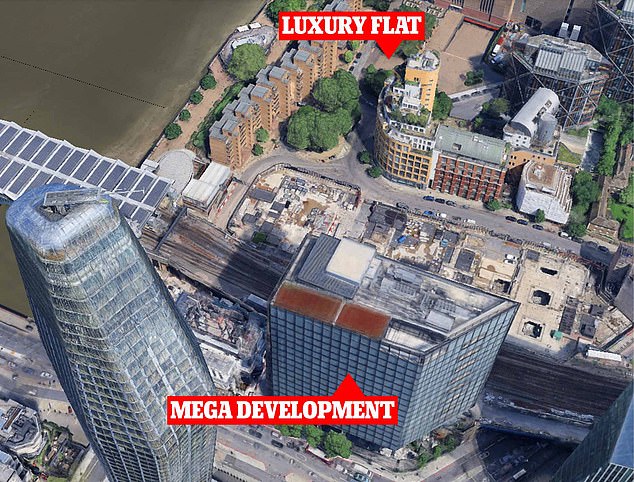
Stephen and Jennifer Powell said the Arbor tower, part of the £2billion Bankside Yards development, (pictured bottom) reduced natural light into their own building (pictured top)
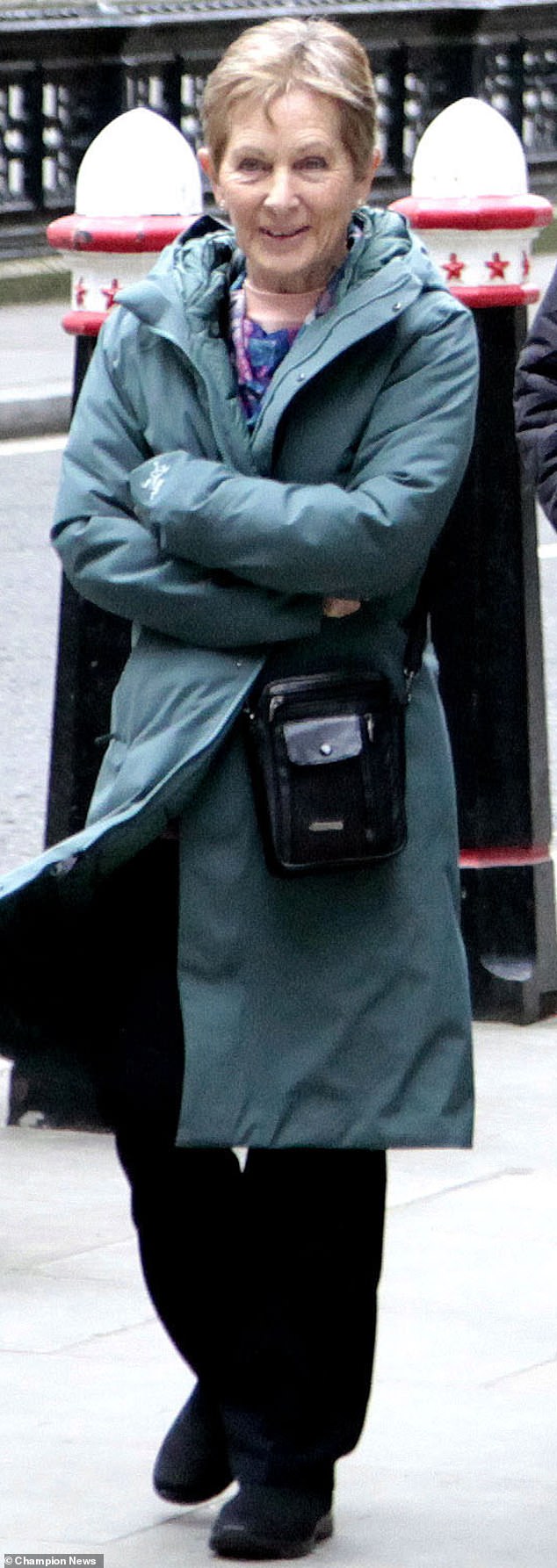
Jennifer Powell is pictured outside London’s High Court. She said her light was being blocked
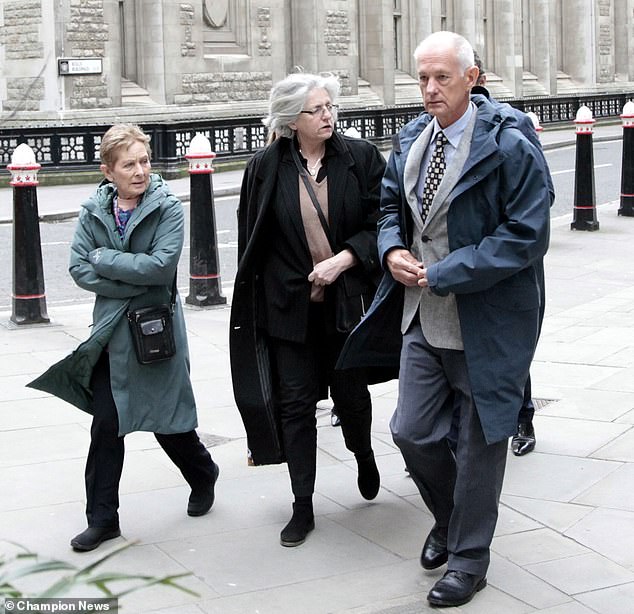
Stephen (right) and Jennifer Powell (left), living in the designer block Bankside Lofts on London’s South Bank, took legal action over a neighbouring new tower
Caroline DeLaney, a partner at Stevens & Bolton LLP, said: ‘The sheer cost of bringing a claim for an injunction means that few cases make it to court.
‘This decision will not increase the risk of a building having to be cut back or demolished.
‘It will, however, embolden claimants in the knowledge that they can potentially obtain a substantial share of the developer’s profits’.
The judge in Stephen and Jennifer Powell’s case said parts of the two flats had been left with levels of light ‘insufficient for the ordinary use and enjoyment of those rooms’.
He added: ‘I also conclude that there will, as a result, be a substantial adverse impact on the ordinary use and enjoyment of those flats.’
Ludgate House Ltd had fought the claims, insisting the tower did not block enough light from the neighbouring trio’s £1million-plus flats to give the owners a valid claim.
And their lawyers said the couple could solve the issue of lower light levels causing them problems when reading in bed by simply turning a light on.
They argued that ‘the loss was not important because the room is a bedroom and any reading in bed would be done with the aid of artificial light’.
They also protested that an injunction forcing them to demolish the Arbor tower would be ‘a gross waste of money and resources’.
The judge agreed with the latter argument, saying demolition ‘could cost £15million to £20million and rebuilding of the whole block would cost around £225million’.
Mr Justice Fancourt went on to say: ‘The claimants say that an injunction is the right remedy to grant because the defendant has deliberately proceeded with its development in the face of the claimants’ rights.’
Neighbours felt the developers had gone on while ‘knowing that there was probably an infringement, and taking the chance that it would be able to buy off the claimants and all those in an equivalent position’, he added.
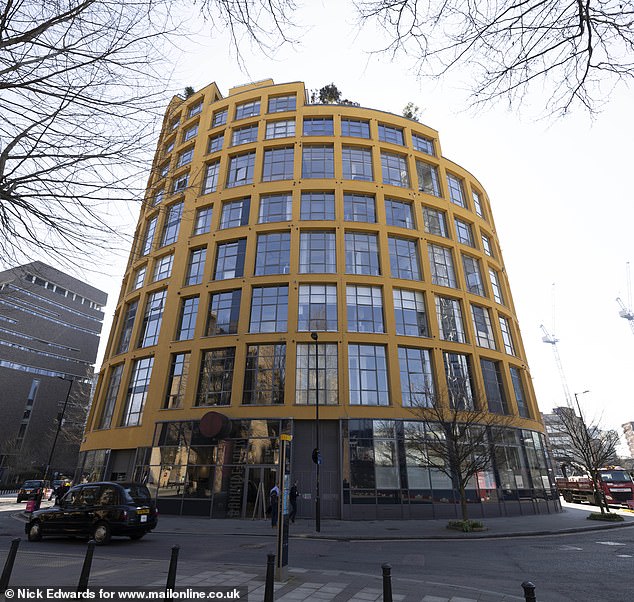
The couple living in their own South Bank designer block have now been awarded £500,000
The judge said: ‘The claimants are people who say that they have a particular and strong attraction to the benefits of natural light directly from the sky, and are unwilling to see that light taken away from them as a fait accompli.
‘The position was, I am sure, exacerbated by advertising the new development as having ‘exceptional levels of natural light’ that promote productivity and wellbeing.’
But he added: ‘There are strong arguments, in modern times, why over £200million of development costs should not be wasted.
‘There would also be substantial harm done by a further, complex demolition contract and considerable environmental damage as a result.
‘Apart from the financial interest of the developer, to which an order for demolition could be said to be oppressive in comparison with the degree of harm done to the claimants, there is a significant public interest that needs to be taken into account.’
The judge went on to refuse to grant an injunction but awarded damages, saying the loss of light has had a ‘substantial adverse effect’ on the flats.
He ruled: ‘The damage is principally to the use and enjoyment of the flats, not to their exchange value – though the reduced use and enjoyment value may have some impact on the market value.
‘Mr Cooper and Mr Powell both stressed that they did not want money, they wanted their light, so that they could enjoy fully the advantages that their flats offered.
‘Despite the loss of light, the flats remain useable, attractive and valuable, but less enjoyable in terms of their good light. The claimants should be awarded damages in lieu of an injunction.
‘I consider that sums that would reasonably have been negotiated and agreed in 2019 to compensate the claimants for their rights of light are £500,000 for the Powells and £350,000 for Mr Cooper. These are the damages that I will award in lieu of granting injunctive relief.’
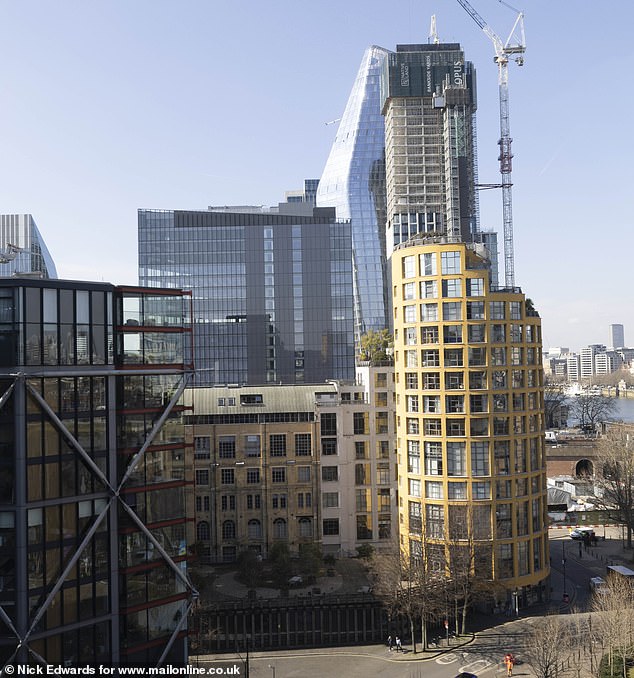
The couple’s flat is located in the round building on the right of this image. The office block is the rectangular glass structure just to the left of it
Neighbours, however, expressed astonishment at the ruling – saying they thought it set a precedent.
One woman, who has owned her dual aspect flat for 12 years, told MailOnline: ‘I was very surprised about the payout, particularly because I thought they had been turned down.
‘I don’t know either the Powells or Mr Cooper who were involved in the case
‘The cheapest flat in here is worth £800,000. Some are very small, some are galleried.
‘I have not yet spoken to other residents about it [the payout]. The right to light row goes back four or five years.
‘I think it depends where you are relative to the building that has gone up. In my flat for example, they sent someone round to test in the very early days and decided no, in accordance with the light laws, I did not have a claim for compensation.
‘They said the parameters were not sufficient, everybody got a letter saying they would come and measure [light levels] and see.
‘I don’t have issues with the lighting. My flat is such that I look at the building and also look the other way, I have got dual aspect. I have a bathroom looking that way, I don’t feel at a disadvantage.’
Asked whether a precedent has been set following the £500,000 and £350,000 payouts to the Powells and a resident called Kevin Cooper, she said: ‘I must admit I hadn’t thought of that but it does set a precedent.
‘My bathroom is going to be compromised in terms of people looking in, not light, I kind of thought I could do transfers on the windows.
‘At the moment I can have a bath with all the windows open on a nice night, I like that. I wonder if there will be compensation for that.
‘It was a pretty ugly building that was there before, it was a data processing centre.’
She stressed that instead of the standard reaction to more development, she was in fact happy about the buildings going up around Bankside Lofts.
She noted: ‘I am happy there is going to be a Mandarin Oriental, it’s London, that’s how it is.
‘It is a fantastic place to live. It is amazing. I have lived here for 12 years and it has got better and better in that time.’
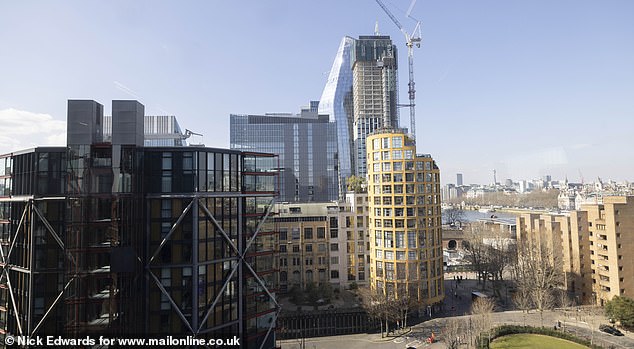
The Powells have lived in their 6th floor flat in the yellow ochre Bankside Lofts building on the South Bank of the River Thames for more than 20 years
Stafford, who works on the reception, said the Powells right to light issue had been raging for nearly 8 years but claimed most residents are disinterested or don’t have a claim as they are renters not homeowners in the block.
He said: ‘About 70/75 percent of the building is renters. The Powells don’t live here. This has been going on for a good seven/eight years.
‘There have not been complaints like the Powells from other tenants. They are all tenants, they don’t know anything about it really.’
One woman who was part of a Residents’ Association which took a separate group of developers to the European Courts of Justice to stop a block of flats which would peer into her flat was shocked when MailOnline revealed the Powells and Mr Cooper had received a combined sum of £850,000 compensation over the light row.
The woman, who lives on the other side of the building to the compensated couples, said: ‘I’m shocked, I live here! I actually think that is outrageous. What’s the compensation for? Losing light, not being able to read in bed? I mean, please! It is very odd.
‘What do you plan to do with this money, do you plan to share it with your neighbours? Ha ha!
‘If I lived that side would I go for it? I can imagine there could be some who will go for compensation, people are going to go ‘oooh, I’ll have some of that!’
‘What intrigues me if there would be people that could apply it retrospectively. It is fascinating.
‘You can imagine these laughable conversations about planning to get half a million compensation. It is totally ridiculous.’
Her friend, who does not live in the building, added: ‘How do you demonstrate that? Have they got some tools in there that say it should be x percentage brighter?
‘Surely there is a side to this where you’re moving into an area that’s going to be developed? There is an expectation there.
‘There is just a template set for this now isn’t there. A precedent, it just takes a neighbour to take the same paperwork and everyone around London can do that now.
‘If it’s worked for a neighbour in there, it’s going to work for someone else. Are they actually that bothered or are just going to take the money and complain about it.
‘£500,000, that is nuts. The light, and in bed, I mean what? I mean, natural reading light, seriously!
‘Are they going to move house, are they going to buy a nice new reading lamp? If it was about noise pollution then ok, but come on.’
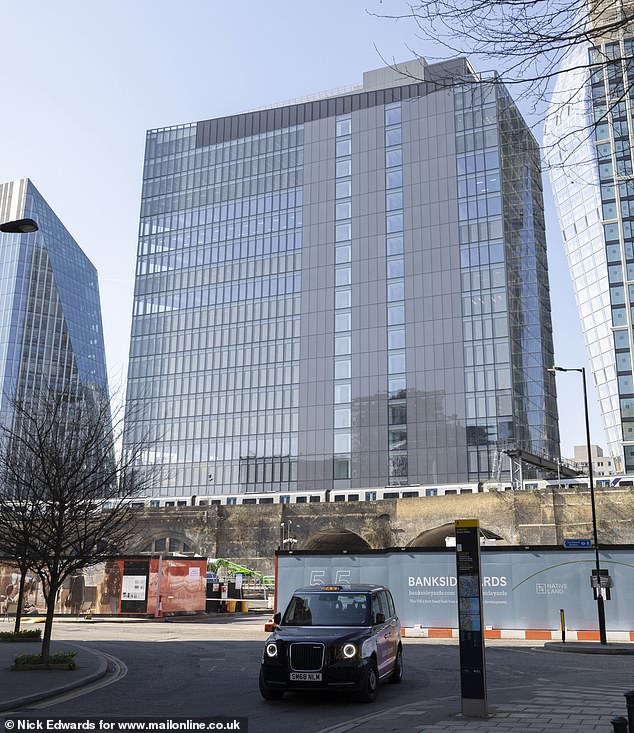
A close-up image of the newer office block, which is part of the Bankside Yards development
One homeowner who lives on the same side as the compensated flats told MailOnline they were aware of the compensation payouts but were not seeking any themselves, despite a precedent being set by the Powells and Mr Cooper’s payout.
The woman, who did not want to be named, said: ‘Yes it’s a lot. We haven’t been after any compensation.
‘I don’t know the people who have got compensation but my husband sent me the article about it.
‘We’ve only just purchased, we haven’t been here for the goings on. But we bought it knowing all this was here.’
During the trial of the case, the court heard that Powells have lived in their 6th floor flat in the yellow ochre Bankside Lofts building on the south bank of the river for more than 20 years.
They had moved in in 2002, whilst property finance professional Mr Cooper bought his 7th floor flat in 2021.
In written arguments put before the court, their barrister Tim Calland told Mr Justice Fancourt: ‘The Bankside Yards development will consist of eight towers, the tallest of which stretches to 50 storeys in height.
‘The marketing material for Arbor describes it as a mega-structure and boasts of exceptional natural light.
‘The claimants maintain that this will have been achieved – wrongfully – at the expense of their light.
‘Light is not an unnecessary ‘add on’ to a dwelling. Light does not just give pleasure, but provides the very benefits of health, wellbeing and productivity which the defendants are using to advertise the development.
‘That is the reason the claimants have brought their claims.’
John McGhee KC, for Ludgate House Ltd, had told the judge: ‘The flats remain useable and desirable and, on any view, valuable.
‘In respect of the bedroom in Mr and Mrs Powell’s flat, the reduction in light is primarily around the headboard of the bed.
‘Anyone reading in bed would use electric light to do so for much of the time anyway. The injury is a minor one.’












